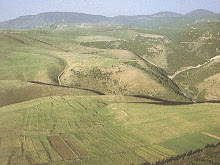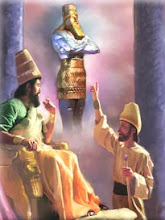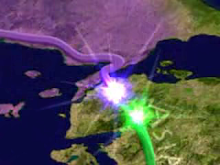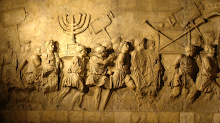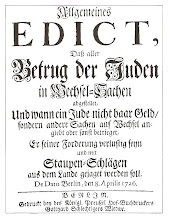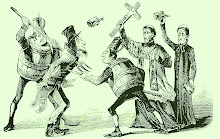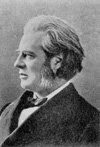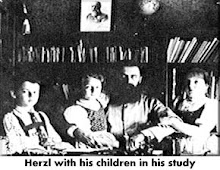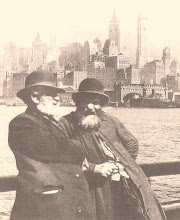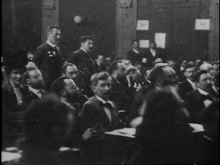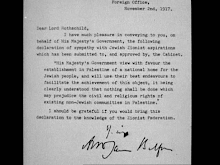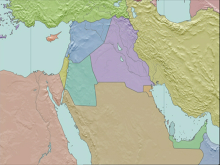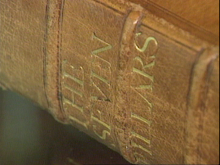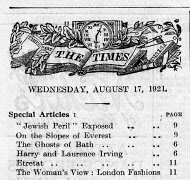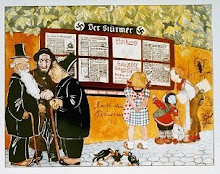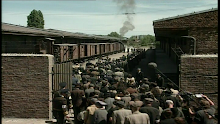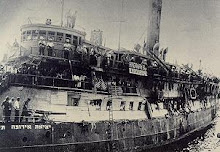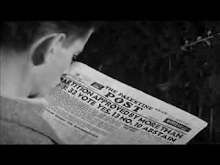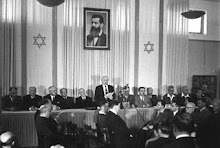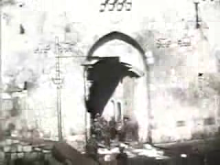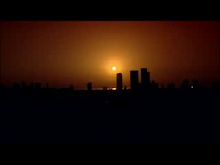ONE OF THE TIGHTEST CONFIRMATIONS
OF THE SIGNPOST-SERIES TODATE
Colin Chapman in his comprehensive overview of ‘Jerusalem and the Israeli-Palestinian conflict’, and titled in its paperback 2004 edition ‘Whose Holy City?’ manages to make implied or direct reference to all four Signpost epochs in the first three paragraphs of his introduction alone! Notice there the identification of ‘the Zionists’ who became specifically viable and operative between 1901-3, and ‘1917 setting in motion and leading to the establishment of the state of Israel in 1948,’ with the consequential centrality of ‘1967 and the capture of the Old City and Temple area,’ the event he notes has been leading since then, and now, to ‘an explosive issue with the potential to ignite a worldwide conflagration.’
And Jerusalem specifically since 1967, he goes on to show, is now become ‘the key’ to one of the biggest of nettles to be grasped…
“ ‘The most famous city in the world’ is how Jerusalem was described by General Allenby – the general who entered it at the head of the British and Allied forces on 11 December 1917. By liberating it from the Turks, they helped to set in motion the train of events which eventually led to the establishment of the state of Israel in 1948 and the intensification of the conflict between the Zionists and the Palestinians.
The very name ‘Jerusalem’ is usually thought to mean ‘the city of peace’, and it is seen as a holy city by the Jews, Christians and Muslims alike, who together make up about 55 per cent of the population of the world. It is holy for Jews because its Temple, destroyed in CE 70, was thought to be where the presence of God was located in a special way. It is holy for Christians mainly because it is where they believe Jesus Christ was crucified and raised from the dead. It is holy for Moslems largely because of the Prophet Muhammad’s association with the city and because of its role in 1,400 years of Islamic history.
People of all three faiths therefore have their different reasons for regarding Jerusalem as holy and wanting to come from the ends of the earth to worship in their sacred sites. The Church of the Holy Sepulchre, also known as the Church of the Resurrection, has been a magnet drawing Christians ever since it was consecrated in CE 335. Since Jews have prayed facing Jerusalem for at least twenty centuries, there was jubilation in 1967 when Israeli forces gained control of the Old City and access to the Western Wall. Many, however, have felt very uncomfortable with the fact that the most sacred Islamic sites had been built over the ruins of the Jewish Temple. This is what leads Meron Benvenisti, a former deputy mayor of Jerusalem, to say that ‘The explosive Temple Mount issue bears with it the potential to ignite a worldwide conflagration, and it is, therefore, a conflict of international importance … A bomb is waiting to go off in the heart of Jerusalem, its fuse burning with the fire of the religious fanaticism of Jew, Muslim and Christian.’
No one can deny, therefore, that people of all three faiths feel a kind of spiritual attachment to the city, and want to have unrestricted access to it. The really difficult question, however, is about sovereignty: who should control it politically and exercise sovereignty over it – especially over the Old City where the major sites are situated? Do the Israelis have the sole right to hold on to it forever? Or is it humanly possible to find a formula that would go some way towards satisfying both the Israelis and the Palestinians, and the Jews, Christians and Moslems?
Conflict of course is not new to this city which, according to Amos Elon, has experienced ‘twenty ruinous sieges, two intervals of total destruction, eighteen reconstructions, and a least eleven transitions from one religion to another. The most recent warfare was during the Six Day War in June 1967, when Israel captured the whole of Jerusalem and the West Bank. Having won the war, Israel resisted calls from the international community to withdraw from Jerusalem and the West Bank, and instead annexed Jerusalem, making it part of the state of Israel in all but name. In spite of a number of proposals and peace processes, the conflict has dragged on since 1967 and, since the outbreak of the Al-Aqsa Intifada in September 2000 and the building of the Separation Barrier/Security Fence, has seemed to be spiraling out of control.
Jerusalem is regarded by many as a key, if not the key, to the resolution of the conflict. Naim Ateck, for example, the Director of Sabel, the Palestinian Liberation Theology Center in Jerusalem, believes that ‘Jerusalem has become a microcosm of the whole conflict. Both Palestinians and Israelis consider Jerusalem to be the heart of the conflict…’ The reason for this claim is that most of the issues in the overall conflict between Israel and the Palestinians are brought clearly and sharply into focus in what has been happening in and around the city. If you understand what has been happening in Jerusalem, you understand what has been happening between Israel and the Palestinians since 1967. If Jerusalem, therefore, perhaps the hardest question of all, could be addressed and resolved in a way that is acceptable to the majority on both sides, it might perhaps point the way to a resolution of the whole conflict. This is one of the biggest nettles that needs to be grasped.”
- “Whose Holy City?” Jerusalem and the Israeli-Palestinian Conflict. pp 7-9 Introduction. Colin Chapman. 2004, A Lion Book, ISBN 0 7459 5134 1
Karl Krysko
***********
'THE MOST COMBUSTIBLE SQUARE KILOMETER -
- IN THE WORLD!'
The 2010 January 18th edition of the BBC television documentary program Panorama, titled ‘A Walk In The Park’, was introduced by Jeremy Vine.
‘It’s a New Year, but an old fight is brewing up again: Palestinians are being thrown out of their homes and Israelis are moving in, even underground,’ he began. ‘A knock on the door at mid-night, an eviction order served, the threat your home could be smashed down. And for others (the Jews) the school-run with armed guards, the fear of violence from the neighbours. This is the reality for many, of life in east Jerusalem.
The Israelis say Jerusalem is their capital city and must never be divided. The Palestinians say the east of the city is theirs and will one day be the capital of a new State…Finding a route to peace in this city is not exactly a Walk In The Park.’
The ‘walk’ referred to the main content of the broadcast that followed the footsteps of reporter Jane Corbin who, starting from east Jerusalem itself, trekked the length of its perimeter borders from Sheikh Jarrah in the north, through Ras al Amoud and onto Silwan in the south, visiting key sites of Israeli and Palestinian conflict over ownership and settlement.
‘This,’ said Jane, ‘will be a walking tour with a difference, through territory that’s been disputed for centuries. For every footstep there’s an argument. For every path, two competing histories. If there’s ever going to be peace, it will have to be made here, in these alleyways (among the people of east Jerusalem).’
‘I’m going to walk along the east side of the city to see what’s happening on the ground and meet the people on both sides who say this place belongs to them.’
Before long she was ‘in the middle of a battle field’ involving bulldozers and riot police. In an area she said was occupied land and should therefore not be changed, under international law. Palestinian housing was being demolished by the Israelis, to Arab cries of ‘where am I to go?’
The modern origins of this conflict go back a few decades, Jane noted, to the birth of Israel itself in 1948 and the war of Independence, and the 1967 Six Day war that also followed. To archive footage of the fighting and Israeli capture of the eastern City, she explained that, ‘When the State of Israel was born in 1948, Jerusalem was divided. The west of the city became part of Israel, and the east was controlled by Jordan. In 1967 Israel annexed east Jerusalem after seizing the West Bank following war with its Arab neighbours.’
During her walk numbers of people were interviewed and the rational, politics and religion involved in both sides of the argument were examined along the way. The Jews see the area as their Land historically with its capital City from biblical times, and as won back legitimately in two modern wars (1948 and 1967) that they didn’t even cause. The Palestinians are equally adamant the Land is theirs, on other political, religious and historical grounds. Meantime, the Jews and their government, the program suggested, are intentionally surrounding east Jerusalem with settlements to appropriate, and consolidate, the region for themselves and, along with the massive wall they are building, to further isolate the Arabs. The Jews say they are only recovering what is theirs and protecting themselves from unjust and potentially deadly reprisals, the like of which used to be common before the wall.
Corbin’s walk terminated in Silwan to the south of the City: ‘Silwan is just a few hundred yards from the old city where I started my journey. It’s here that the bitterness and the suspicion between Palestinians and Israelis could well find its focus, in the most combustible square kilometer in the world. Settlers have been moving into houses in the Moslem quarter of the old city; more than forty properties so far. Israeli archeology has raised Arab suspicions of a Jewish takeover of the Moslem Holy sites.’
Superintendent Ofer Shomer, of the Israeli police added, ‘the most sensitive place for us is the back of the Western Wall,’ which compound, also including the Dome of the Rock and Alaqsa Mosque, was taken by the Israelis in the 1967 war. Jane Corbin suggested that ‘he has one of the hardest police jobs in the world, making sure Jews and Moslems can pray in peace here.’
Only as recently as last October, for example, and hardly for the first time, the area had flared up violently, as more archive footage of that event showed: ‘Last autumn Palestinians rioted after rumors spread that Israelis were coming to pray on the compound surrounding the holy mosques. The Israelis say some Palestinians were exploiting the recent tensions caused by the evictions, and demolitions in east Jerusalem.’
‘Those who know Jerusalem warn that this is a powder keg. More than the city could be ignited if the Israelis persist in what they are doing’, she added.
Concluding her report Jane noted, ‘The Israelis have promised a temporary halt to building settlements in the West Bank to kick-start peace talks. But the Palestinians say they are only interested if east Jerusalem is part of the deal. Meanwhile, the face of the city is changing and that makes the chances of peace even more remote.’
Signpost Comment:
Of all the dates, and times, and events possible in the long history of the Arab-Israeli conflict, only two were mentioned specifically in the entire report; ‘1967’ once and ‘1948’ four times (once by context), and were expressly identified and implicated in the dangerous and intractable current Middle East dilemma.
We would note as well, of course, that these are two of the most recent Signpost Years, clearly identified repeatedly by secular television reporters, writers and historians but forenamed from the prophetic Old Testament book of Daniel by biblical scholar Adam Clarke way back in 1825 AD.
The magnitude of the ongoing problem that now exists in the Middle East was further expressed in the program by Danny Seidemann, interviewed several times, commenting in the context of east Jerusalem itself with the Western Wall, and the Dome and mosque on the Temple Mount compound - ‘the most combustible square kilometer in the world’ - as Corbin had put it. He added ominously to that,
‘This is the volcanic core of the conflict, and if the conflict will not be resolved here, what happens in Jerusalem doesn’t stay in Jerusalem. An eruption in Jerusalem over religious sites, over the national sites, will send tremors throughout the region that can destabilize regimes from Pakistan to Morocco, and everywhere in between.’
- from BBC TV Panorama, January 18th 2010.
.............................................................................
THE MIDDLE EAST CRISIS IS 4000 YEARS OLD
CLARKE-GUINNESS SAW ITS RESOLUTION WITH THE SIGNPOST YEARS.
In the following notes we focus on one episode in particular in the UK television series ‘The Bible’, currently being broadcast nationally, in seven parts. The episode of interest here is the second in the series first shown in January 2010 on the life and decedents of the patriarch Abraham, a figure acclaimed strongly by Moslems, Jews and Christians alike.
The presenter of this episode, the Moslem journalist Rageh Omaar, is especially appropriate for investigating and unraveling this crucial aspect of the circumstances relating to the current Middle East crisis, described here in its longstanding historical context that reaches back 4000 years. And while there are several points he makes that are, perhaps, incomplete or slanted toward his own interpretations, the overall view is readily faithful enough to agree with interpretations from the two other leading faiths associated with that history.
Much of this text reports quite directly what Rageh and others said, though there is some editing for simplicity and not all of the program was directly relevant to the history we wish to emphasize here. However, special attention has been paid to maintaining the integrity of what was being described in the broadcast regarding its historical components.
Abraham, it is universally agreed, lived around 2,000 BC.
from THE BIBLE: A HISTORY
(Episode 2 “Abraham” - Channel 4 TV 10jan31)
‘Abraham’s life is the first detailed biography in the Bible. We are told where he was born, where he traveled, and the tasks God put him through. And the Bible tells us where Abraham and his family are buried, in Hebron, Israel’s disputed West Bank.
‘For Jews, Abraham is the father of their nation, but amazingly Christians and Moslems also revere Abraham as their patriarch, and they say they are also descended from him.
World statesmen frequently invoke the name of Abraham as a unifying figure for all the three faiths:
“Many Jews, Moslems and Christians are entirely ignorant of the rich Abrahamic heritage we share in common.” (Tony Blair) “The United States will work for all the children of Abraham.” (George Bush, Jr) “And all the children of Abraham will live side by side in peace.” (Bill Clinton).
‘You’d think this common claim of ancestry would be enough to unite these faiths, but you’d be wrong. Comments by local people illustrated this point, “The Land of Israel was promised to the Jewish people…the Jewish people only.” “From my perspective, Abraham is for the Jews and the Christians.” “Abraham is a true Moslem. Neither a Jew nor a Christian, but a Moslem.”
‘Two billion Christians, one and a half billion Moslems and twelve million Jews claim Abraham as the father of their faith. I want to find out who is Abraham and what are the differences in the Abraham of the Christian and Jewish Bible, and the Abraham of the Koran. Is Abraham’s legacy one of the greatest sources of division in the world today, or does the great patriarch hold the key to peace and reconciliation?
‘I was brought up as a Moslem, and as a child I was taught that Abraham was a great prophet in the Koran. But I was also educated at Christian schools in Britain, where I picked up a basic understanding of the Bible’s account of Abraham. I learnt that at a time when everyone else was worshiping many gods, Abraham agreed to worship only the One God. I was taught that in return, God promised Abraham, and through him the Jewish people, Land – modern day Israel.
And the part of the story I’ll never forget is when God tested Abraham by ordering him to kill his son Isaac.’
The program notes that God promised Abraham a new and prosperous Land wherein he would be blessed. He would become the father of many nations, one special, through which all other nations of the earth would someday be blessed. All that Abraham had to do was obey and in faith leave his home-town Ur, journey and follow God’s call. This would be God’s unconditional Covenant with Abraham and his decedents forever.
‘Of all the unlikely places, the story of Abraham starts in Iraq. I’m near the place where, according to Biblical traditions, Abraham was born some 4000 years ago. This is US Tell al-Muqayyar military base in southern Iraq, today it’s home to 8000 American soldiers, who are here to reconstruct the country in what the American military calls “Operation Enduring Freedom.” The last time I was here reporting on the Iraq war, there was bitter fighting between insurgents and US soldiers. I’ve returned this time because this military base is said to be close to the place where Abraham was born.
‘Now, the Bible says in Genesis that Abraham was born in Ur of the Chaldees, and in Jewish and Christian tradition, Ur of the Chaldees is located in modern day Iraq, in fact a specific location just the other side of the perimeter fence to this military base. The ruins of the city of Ur are dominated by a ziggurat or temple. It was a sacred site for the Sumerian people, the world’s oldest known civilization.’
Omaar is joined by a local leading archeologist, Mr Abdul Ameer Amdarni of the Iraqi State board for Antiquities and Heritage. They point out that Ur was the capital city of the Sumerian kingdom. It spanned a large area and had real wealth. There were other associated cities. They had a legal system, arts and literature, and Abraham and his family would have been part of that system. There was a royal palace, burial grounds and an eastern region in Ur where most people were housed, probably including Abraham and his family.
So Abraham was a sheik from the Iron Age period, a time when people followed and worshiped many different gods and idols. The ziggurat temple there was dedicated to the moon god Nanna, but the Sumerians worshiped many gods in fact, numbering 5,000.
‘According to the Bible, Genesis chapter 12, when Abraham was 75, God told him to “leave your country, your relatives and your father’s home and go to a Land that I am going to show you.” God told Abraham to “follow Me” and Abraham obeys and for the next one hundred years he wanders the region we now know as the Middle East. And many people believe he followed the rout [that took him through Iraq to Haran, today in southern Turkey, and down through Syria to Canaan, today the Israeli and the Palestinian territories].
‘From now on, all the key events in Abraham’s life take place in this region. This powerful moment when Abraham answered a call from God to give up everything, and to follow Him, is central to the Jewish, Christian and Moslem faiths.’
ABRAHAM AND 'THE CHAOS IN THE WORLD TODAY'
At a US army base in Iraq, the army Chaplin Ron McKay is conducting a bible class on the subject of Abraham. McKay explains the story and its modern consequences: “When it comes to the birth of nations there’s no greater founding father than father Abraham. To understand Abraham is to understand the entire scripture. And of course there are different viewpoints and interpretations, and it truly is the continental divide of all theology. And that is one of the reasons our world is so chaotic this very day.”
Rageh asked, ‘Chaplin, why is what is happening in Iraq taking place; why do you find yourself here today, and what relevance is it to the story of Abraham?’ McKay answered, “Everybody wants a piece of Abraham. Everybody wants to take those promises and apply it to them self. The Jews want it, the Christians want it, and the Arab people want it.”
Again, ‘Do you feel that Abraham can be shared between all the three main faiths?’ “From my perspective, as a Christian I believe that Abraham is first of all the Jewish father through [his son] Isaac, the son of promise, and I believe that through an extension of that, to Jesus Christ who was the descendent of that lineage. I view the Islamic scriptures and their interpretation as a little too late onto the scene, and yes from my perspective, Abraham is for the Jews and the Christians.” (The Koran, in fact, did not come into existence until the seventh century AD).
‘And there was I thinking we all “share a rich Abrahamic heritage” to quote Tony Blair’ quipped Rageh, ‘but in this version of divine history I have just heard, one and a half billion Moslems are being denied their claim to Abraham.
‘This area [around Ur] is a quiet but still eerily-uneasy place, and for many Moslems Iraq remains a Moslem country that is occupied by a largely Christian – Western army, and they point as evidence that right here you have an American base slap bang next door to the supposed birth place of Abraham, the father of the three monotheistic faiths. And already, at the beginning of my journey to tell the story of Abraham, I can see that his legacy is a complex one, and is one defined by conflict.
THE ABRAHAM HISTORY AND ITS ‘REPERCUSSIONS TODAY’
‘I’m on a quest to find the Abraham of the Jewish-Christian Bible and in the holy Moslem Koran. I have traveled to Iraq, once part of ancient Mesopotamia, to visit the place where, according to biblical tradition, Abraham was born. Now I want to know how the account of Abraham in the bible came to be written.’
Omaar visited a theological commentator, versed in the Hebrew language, Dr Francesca Stavrakopoulou of Exeter University. She suggested that the biblical account of Abraham in Genesis constituted ideological writings to consolidate whom the Jews were and where they had come, following their national capture and deportation to Babylon around 600 BC. They had lost their Temple and national identity, a time of great struggle and uncertainty. They have lost their political independence and are now in exile. But they still have Abraham.
This story, written then, gave them hope of a return to their Land since they would be retracing the journey of the patriarch from the very land of his birth. “So obviously, that has certain repercussions today in the sense that people believe that this Land is still promised to the people who claim decent from Abraham,” she indicated.
Moving onto Jerusalem, and caught up in an ongoing street battle, Rageh notes that, ‘The moment I set foot in Israel, I’m caught up in the repercussions of Abraham’s promise of Land; Land the Palestinians have occupied for centuries and which the Jews believe belongs to them. The battle I’m witnessing is between Jews and Moslems over access to one of the holiest sites to all the faiths, the Temple Mount, or as Moslems call it, Al-Haram al-Sharif (noble sanctuary).
They said there would be tension and there was. The Palestinian boys started throwing rocks and now there’s a huge security operation clearing the areas around the compound.
‘While the security forces breakup the crowd around the Temple Mount, I’m heading to the Western Wall, one of the holiest places for the Jews. A group of Jewish boys are celebrating their bar-mitzvah, the time when they come of age. They will have learnt from their birth the story of Abraham and God’s promise of Land to the Jewish people.’
Rabbi Ken Spiro told Rageh, “We Jews view ourselves as spiritual inheritors of Abraham and even as physical inheritors of Abraham. When I say spiritually, we are descendants of Abraham [the man] who signed on the dotted line with God. He is the individual who made a Covenant with God, about 3800 years ago, and we see throughout the Bible that God is constantly re-affirming that relationship. Whenever He speaks to the Jewish people in successive generations, He always goes back to the original signer on the agreement.
The Jewish people are a unique nation that is supposed to actualize this mission of being a light to nations in one specific piece of real estate. And the Land of Israel has the unique holiness and ability to it that enables the Jewish people. It’s our power supply. The way I explain it is that we are the appliance and the only outlet we can plug into, that really fits, is the Land of Israel.’
Rageh said, ‘I can feel this passion among Jews that, for them, Land and faith are inextricably linked, and it is though Abraham that that knot is tied. But where do other faiths fit into the picture?
‘Archbishop Aristarchos is the patriarch of the Greek Orthodox Church in Jerusalem.’ He said, “We believe what is written in the Old Testament about Abraham, in Genesis. Abraham is for the Jews and us Christians, one of the great patriarchs.”
Rageh asked, ‘What do Christians believe about the Covenant that God made with Abraham?’
The patriarch replied that, “We believe that God made the Covenant with Abraham for the Jewish nation, but then as well through Jesus Christ, who is a descendant of Abraham, through whom we are called to God according to the New Testament Covenant.”
Rageh noted, ‘What you are saying is the Covenant in Jesus Christ is the fulfillment of the Covenant with Abraham?’ “Yes” came the reply, “we believe so, this is the Christian belief.”
Continuing Rageh’s dialogue, ‘And significantly, writers of the New Testament were at pains to establish a family tree for Jesus that stretches all the way back to Abraham.
‘The last of the great monotheistic faiths, Islam, came on the scene much later in the seventh century [AD], and as I learned as a boy growing up in London, from Moslems, Abraham is also the great patriarch of their faith.
‘I’m meeting with Dr Mustapha Agusway, associate professor of Philosophy and Islamic Studies at Al Utts University, Jerusalem. Submission to God, he pointed out, is not only the essence of the Abraham story, it’s actually the definition of what is meant to be a Moslem. ‘How do Moslems see themselves as being connected to Abraham?’ Rageh asked. Agusway replied, “Abraham is mentioned in the Koran as the first Moslem, he called for pure monotheism, and is the first one to submit to the will of God. And this is why Moslems basically mention him every day in their prayers.”
‘And in terms of the importance or centrality of Abraham in the Koran?’ Rageh continued. “Islam perceives itself as the last phase of revelation, and on that line of prophets we have Abraham and the family of Abraham. In the Koran most of the 25 names of prophets come from the lineage of Abraham.”
Rageh also wanted to know, ‘Do Moslems believe that they have ‘a promise’ from God through Abraham, of Land in the way that there is this promise, this Covenant in Judaism?’ The reply confirmed that “There is no Covenant with Abraham that is related to this land. Ultimately, it is the idea of being a monotheist, of submitting oneself to the Will of God, and that’s where the story of Abraham is very, very important in the Koran.”
The deduction is clear, ‘All three faiths revere Abraham, but they all have different interpretations of his story. For Jews the critical thing is the Covenant that God makes with Abraham over Land. Christians argue that the Covenant was superseded by the Covenant God makes with His own Son Jesus Christ. And for Moslems, Abraham is the highest example of obedience to God. But what all these religions share is their admiration for Abraham’s willingness to “risk it all” for God. And for God, Abraham is willing to travel thousands of miles, and everywhere he went he built alters to worship Him.
ONE LAND – TWO WOULD-BE HEIRS: THE CONFLICT BEGINS
‘But as well as Land, God promised Abraham many descendants. He said, “I will make your offspring as numerous as the stars of heaven and as the sand that is on the sea-shore.” Yet now in his eighties, Abraham had no children. So I went to find out how God fulfilled this side of the bargain, to make Abraham the head of a huge family. ‘In the desert he traveled with his wife Sarah who was in her seventies, and with her servant Hagar, together with the household.’
Francesca adds, “We are told from the very beginning of the story that Sarah his wife is infertile, she is barren. So all the time while we’re placing Abraham’s story in the biblical tradition, we’re thinking, ‘where are the kids? How is he going to fulfill this promise of a nation of descendants?’ Sarah decides to give Hagar to Abraham. And so with Hagar, Abraham has his firstborn child, Ishmael. But then, some years later, God performs this incredible miracle. He is the God who can open the womb, and Sarah conceives, and she has a son, Isaac. And so you have two women (the two mothers) and two sons.”
Once again Rageh is on the move: ‘I’m on my way to Beersheba, 50 miles south of Jerusalem, where Abraham was directed by God to live, and where it’s believed some of the most dramatic and disturbing episodes in the life of Abraham and his family were played out.
‘Avna Gorren is an archeologist whose recent work has focused on the study of sites key to Abraham.’ He said, “Sarah was quite an old lady and she didn’t yet have a child, and therefore she decided to offer Abraham her maid, Hagar, and Hagar got pregnant and gave birth, and even before giving birth she started to ignore Sarah and did not treat her well.” Rageh asked, ‘Because she was pregnant and Sarah was still barren?’ “Yes, after giving birth to Ishmael, 13 years later Isaac was born, Sarah wanted to get rid of both of them. She forces Abraham to send Hagar and Ishmael away, and they went into the desert.”
Rageh continues the account: ‘From Beersheba, Abraham banished his son Ishmael and his mother Hagar, out into the desert where he must have known they were likely to die. But God intervened to save Ishmael, and sent an angel to tell Hagar, “Fear not, for God has heard the voice of the lad where he is. Arise, lift up the lad and hold him with your hand for I shall make him a great nation.”
‘Mother and son survived. Some interpretations of the bible claim that Ishmael went on to become the father of the Arab people. According to Islamic history, Abraham leaves Hagar and Ishmael in the desert in Mecca. Later on in this account, Abraham and Ishmael are re-united and together build the foundations of the Katbah, Islam’s holiest shrine. But according to the Bible, Ishmael never sees his father again. And Abraham’s troubling relationship with his children gets worse.
‘What happens here next in Beersheba is for me the most horrific part of the story of Abraham, and the part that is most difficult to understand. God demands of Abraham to show his utter devotion to Him, by carrying out the most terrible sacrifice of all. According to the biblical tradition, God instructs Abraham to leave this place and go to a mountain in order to kill his beloved son Isaac.
‘I’ve traced Abraham’s journey through the desert as he followed God’s orders and I’ve looked at his desperate attempts to produce a son and heir in Isaac, as well as the banishment of his first son Ishmael. But now I’m back in Jerusalem in order to explore the defining moment in Abraham’s relationship with God, the two women in his life, and the two sons.
The Jewish and Christian bibles describe how Abraham was willing to submit to God and sacrifice his son. For Jews the Akedah or ‘binding’ of Isaac is a sublime moment.
Archeologist Spiro picks up the account, “Abraham takes Isaac, they take wood; they hike up the hill. He makes an alter there. He ties his son up. He’s about to do it and an angel appears and says, ‘Don’t send out your hand against the child, now I know you’ve go what it takes,’ basically. But it’s really God pushing Abraham to the absolute limit to see if he’s willing to go all the way – if his dedication to relationship with God in truth supersedes even his love for his son. And we say that is the power that was embedded in Abraham’s soul, and that would be carried on to the Jewish people generation after generation.
This took place underneath the golden Dome which is actually the most holy area, the highest part of that hill underneath the golden Dome, contrary to what a lot of people think (that the Western Wall is the holiest spot in the world for the Jewish people).
‘CRUCIALLY’ - WHICH HEIR WAS THE SON OF PROMISE?
Rageh elaborates. ‘In this divided Land, the golden Dome or "Dome of the Rock" is under Israeli control but managed by Moslem authorities. In fact, it’s been a Moslem shrine for 1300 years and is the oldest existing Islamic building in the world. For Moslems it is holy because this is where, they believe, the prophet Muhammad ascended to heaven. But they don’t believe Abraham tried to sacrifice his son here. And crucially, unlike the Jews, they believe it was Abraham’s firstborn son Ishmael, not Isaac, who was the intended offering to God.’
The question was put to Dr Mustafa abu Sway of Al-Quds University, ‘What does the Koran say about this moment where Abraham was tested to sacrifice his son, and its importance?’ He replied, ‘Abraham was put to the test. Abraham was asked to sacrifice his son, and we know it was Ishmael. He succeeded in absolutely submitting himself to the will of God and there was not a speck of doubt. And he survived the test because he knew it was from God. It’s a beautiful moment, the way we read it in the Koran.’
Rageh sums the main point: ‘For Moslems, Abraham’s son Ishmael is the forefather of the prophet Mohammed. Jews, on the other hand, claim descent from Abraham’s son Isaac. But what both faiths share is an admiration for Abraham’s willingness to show his total devotion to God, by being prepared to kill his own son.
As a chicken is sacrificially killed in Jerusalem, Rageh observers, ‘In a few hours time one of Judaism’s most holy days, Yom Kippur, will begin. This event is marked with a sacrifice intended to clean the believer’s sins. It seems that everywhere I go in Jerusalem, I am confronted by the themes of blood and sacrifice that is central to the Abrahmic story.
‘What I really need right now is a contemporary take on the Abraham story. So, I’m meeting one of Israel’s most leading human activists, Annett Hoffman. She’s also a self-taught reader of the Hebrew Torah (books of the Old Testament).
‘SIBLING RIVALRY OF THE WORSE KIND’
She reads from the account in Genesis, “And He said, ‘Abraham.’ And he said, ‘Here I am.’
‘Take your son, your only one, the one you loved, take Isaac and go to Moriah mountain, and sacrifice him for me.’ Well first, let’s start with the fact that it’s a very dysfunctional family. Extremely dysfunctional. Dysfunctional toward boys and toward women. Dysfunctional all around. He tries to kill both his children, both the son of Hagar (Ishmael) and the son of Sarah (Isaac). What kind of a father is it?
So, and then forever we are locked, the sons of Isaac and the sons of Ishmael, who did he love more? It’s sibling rivalry of the worse kind. Who did he promise the Land for? So the conflict that we’re all hearing about in the news is an old sibling rivalry stemming from this.”
Rageh asked, ‘Do you think that that heritage, of the sacrifice, is still very much alive?’ “Absolutely, absolutely. I’m afraid that the fundamentalist religion encourages total commitment, and the extreme total commitment is to kill yourself to God. And unfortunately, this is still the discourse here.”
‘THE BITTEREST AND MOST INTRACTABLE CONFLICT’
‘So where,’ asks Rageh, ‘does this lethal corrosion of sibling rivalry, and the worship of sacrifice, lead? Well, I’ll tell you where it leads to: It leads to one of the bitterest and most intractable conflicts in the Middle East. The question of ownership of Land. And nothing could summarize that more than the stark, huge wall aimed at separating the children of Abraham (that runs many miles through the area).
‘In the bible, Abraham lives to be 175 but he is mortal and his story does have an ending. I’m heading to Hebron, south of Jerusalem, where both the Bible and the Koran agree Abraham died and is buried. Hebron in Hebrew is from the word Haver and in Arabic, Al Khalil. Interestingly, both words translate as ‘dear friend.’
But this town is not a place of friendship. Abraham’s final resting place, in fact, is the front line in the battle between Palestinians who have lived here for centuries, and Jewish settlers who think that through Abraham, God promised the Land to them, and them alone. It’s here in Hebron that Abraham’s two sons, separated when they were children, meet for the last time to bury their father [Genesis 25 verse 9].
‘Ishmael, according to some, became the father of the Arab people, and Isaac father of the Jews. Today marks the point in the Jewish calendar when pilgrims from all over Israel come to Abraham’s tomb to honour him. But divisions in here mirror divisions outside. This place of worship is literally split between two faiths. There is the Moslem side and the Jewish one, and neither can enter the other’s holy place. A day of celebration cannot disguise the apartheid that plagues this town, even the streets are divided – concrete blocks separate Jews on the left from Moslems on the right.
‘The center of the town is home to 170,000 Palestinians. High above Hebron are two Israeli settlements, inside of them live 800 Jews. Above you can see (on grating covering the streets below) the rocks and rubbish that the settlers throw down on the Palestinians, and nothing symbolizes the breakdown in the relations between Abraham’s families more than this tense and divided town.’
Rageh asked one of the Arabs in the town, ‘The Jewish settlers say this Land belongs to them because God gave it to them, what do you think?’ The retort was to be expected, “This land does not belong to them. This has been Islamic land for many centuries, stained with the blood of martyrs. Abraham is a true Moslem, neither a Jew or a Christian, but a Moslem.” The interview continued, ‘Why is Abraham important today among Moslems?’ “He’s important to us at all times. There’s no need to say ‘a long time ago’, Abraham is important to us today and at all times.”
‘Jews, Moslems and Christians all call Abraham their father, but so far I’ve failed to find evidence of how his story unites them. I’m feeling discouraged. Surely in Israel there must be some members from the families of Abraham who are campaigning for peace instead of suing for war…Everywhere I’ve been in Israel I’ve seen dissent and division. But in the Bible God promises Abraham in Genesis, “I will make you a great Nation, and in you all the families of the earth shall be blessed.”
‘A DEADLY RIVALRY THAT HAS PLAGUED THE CENTURIES’
‘The politician’s cozy vision of a family of three united faiths [noted at the beginning] now seems hopelessly naive. From the point where Abraham banished his son Ishmael, and favoured Isaac, he set up a deadly rivalry between the two branches of his family, which has plagued them down the centuries.’
Rageh concluded the episode, ‘But I don’t lay all the blame on Abraham. I think that we must share the blame, particularly in continuing to make some of his worse mistakes, such as the willingness to sacrifice our children. I think that what we have to remember is what God told Abraham in the Bible; that he would be the father of “many nations”, and if that is to mean anything, it has to mean “all nations”. And until that notion is fully embraced then we, the children of Abraham, seem doomed to continue this fatal feud.’
Signpost Comment:
It isn’t possible to agree with many of Rageh’s views on the behaviour of Abraham and other issues he gets muddled in the presentation, but he has hit several nails on the head also.
This festering, centuries-old rivalry spans human history, going back to the very first book of the Bible and, indeed, starting with Abraham at the very first ever established and acknowledged source of civilization even in secular chronologies, at Ur of the Chaldees in Mesopotamia 4,000 years ago.
But the conflict’s modern expression began in earnest a century ago, punctuated and amplified at each epoch in the series of Signpost Years (involving precisely the sudden rise and viability of Zionism, the failed British promise of a Palestinian State, the rebirth of Sovereign Israel (instead), the capture of ancient East Jerusalem and Temple Mount). Each of those successive landmark issues, unfolding on time, are now the exact source of the most contentious and dangerous political, cultural and religious conundrums on earth.
Not only does the Bible record the ancient origins of the Middle East conflict but, if the Clarke-Guinness dates are correct, it also prophetically notified us 2,500 years ago, in the Biblical book of Daniel, of this current crisis and its modern key issues, both temporally and concerning Land and locations-ownership in the Middle East - Signposting the run-up to the conclusion of the Isaac-Ishmael (and other) conflicts. Both Clarke and Guinness foresaw this ultimate impending rivalry between a re-instated Israel and Islam. But they both saw it too as signaling the imminent fulfillment of those blessings Promised to Abraham’s direct offspring and, by proxy, Promised to all other nations on earth as well [Daniel 2:44].
10feb23
*******
Introduction
ONE HUNDRED AND FORTY YEARS BEFORE the actual events came to fruition in the Middle East, two dedicated Bible scholars predicted accurately several key years in the then approaching conflict for tenure of the holy Land and Jerusalem, involving a long prophesised regathering of the Jews to their Promised Land, after nearly 2000 years of Diaspora.
Doctors Clarke and Guinness pointed well in advance to the coming years 1902, 1917, 1947-8 and 1967 AD, having based their predictions on the 2,500 year old Biblical book of Daniel.
Not only did their advance forecasts prove accurate decades later, but those key 'Signpost Years’ continue to mark events and developments in the holy Land, ever since their occurrence in modern times, that now represent the specific themes of serious contention in the struggle for Peace in that region today.
These following NOTES explain the rational behind the Clarke-Guinness thinking in as fast and concise a form as possible, and elaborations will follow. A second critical aim here is not to prove 'The Signpost Years' correct, but rather to use the scientific approach of attempting their falsification first. You can help either way by passing on any objective comments to this site.
PART 1 Is an Introduction and looks at each of the Signpost Years as they were foretold in the writings of Guinness and Clarke. It looks at many of the side issues and has a number of detailed footnotes.
PART 2 Looks at the period 1901 – 1903, and the first of the Signpost Years predicted by Clarke in 1825. This part explains the huge significance of the period and sets the scene for a further link that comes in Part 4.
PART 3 Begins to address some of the typical questions that might arise in the mind of the reader regarding the Signpost Years. Items are added to this from time to time as new considerations are brought to light. Again, feel free to contribute any comments that will add to those pages.
PART 4 Looks at the Signpost Years in the light of the last 6 months of Christ’s Ministry, and especially the last week of messages He imparted to His followers for the future. It ties directly back into PART 2.
*****************************************************
TO READ SPECIFIC 'CHAPTERS' CLICK ONE OF THE 'QUICK LINKS' LISTED DIRECTLY BELOW, AND TO READ OR ADD COMMENTS, CLICK 'POST COMMENT' AT THE END OF EACH CHAPTER THAT WILL OPEN AN EMAIL BOX TO SEND TO THIS BLOG.
AGAIN YOU CAN SIMPLY EMAIL TO:
karl@thesignpostyears.com
Click on QUICK LINKS to Parts 1 to 4 of the Signpost Notes:
Part 1: Introduction, Timelines, Conclusion.
Part 2: The SignPost Year 1902 AD and Max Nordau
Part 3: Q & A on the Signpost Years
Part 4: Jesus and the Signpost Years
Doctors Clarke and Guinness pointed well in advance to the coming years 1902, 1917, 1947-8 and 1967 AD, having based their predictions on the 2,500 year old Biblical book of Daniel.
Not only did their advance forecasts prove accurate decades later, but those key 'Signpost Years’ continue to mark events and developments in the holy Land, ever since their occurrence in modern times, that now represent the specific themes of serious contention in the struggle for Peace in that region today.
These following NOTES explain the rational behind the Clarke-Guinness thinking in as fast and concise a form as possible, and elaborations will follow. A second critical aim here is not to prove 'The Signpost Years' correct, but rather to use the scientific approach of attempting their falsification first. You can help either way by passing on any objective comments to this site.
PART 1 Is an Introduction and looks at each of the Signpost Years as they were foretold in the writings of Guinness and Clarke. It looks at many of the side issues and has a number of detailed footnotes.
PART 2 Looks at the period 1901 – 1903, and the first of the Signpost Years predicted by Clarke in 1825. This part explains the huge significance of the period and sets the scene for a further link that comes in Part 4.
PART 3 Begins to address some of the typical questions that might arise in the mind of the reader regarding the Signpost Years. Items are added to this from time to time as new considerations are brought to light. Again, feel free to contribute any comments that will add to those pages.
PART 4 Looks at the Signpost Years in the light of the last 6 months of Christ’s Ministry, and especially the last week of messages He imparted to His followers for the future. It ties directly back into PART 2.
*****************************************************
TO READ SPECIFIC 'CHAPTERS' CLICK ONE OF THE 'QUICK LINKS' LISTED DIRECTLY BELOW, AND TO READ OR ADD COMMENTS, CLICK 'POST COMMENT' AT THE END OF EACH CHAPTER THAT WILL OPEN AN EMAIL BOX TO SEND TO THIS BLOG.
AGAIN YOU CAN SIMPLY EMAIL TO:
karl@thesignpostyears.com
Click on QUICK LINKS to Parts 1 to 4 of the Signpost Notes:
Part 1: Introduction, Timelines, Conclusion.
Part 2: The SignPost Year 1902 AD and Max Nordau
Part 3: Q & A on the Signpost Years
Part 4: Jesus and the Signpost Years
Sunday 31 January 2010
Subscribe to:
Posts (Atom)
The SignPost Years
Click on QUICK LINKS 1 to 3 here for Signpost Year Notes:
Part 1: Introduction, Timelines, Conclusion.
Part 2: The SignPost Year 1902 AD and Max Nordau
Part 3: Q & A on the Signpost Years
Part 4: Jesus and the Signpost Years
Part 1: Introduction, Timelines, Conclusion.
Part 2: The SignPost Year 1902 AD and Max Nordau
Part 3: Q & A on the Signpost Years
Part 4: Jesus and the Signpost Years
